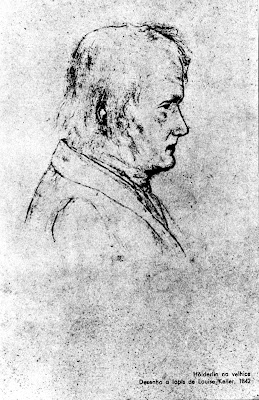"The Circus Animals' Desertion "
The Circus Animals' Desertion
I
I sought a theme and sought for it in vain,
I sought it daily for six weeks or so.
Maybe at last, being but a broken man,
I must be satisfied with my heart, although
Winter and summer till old age began
My circus animals were all on show,
Those stilted boys, that burnished chariot,
Lion and woman and the Lord knows what.
II
What can I but enumerate old themes,
First that sea-rider Oisin led by the nose
Through three enchanted islands, allegorical dreams,
Vain gaiety, vain battle, vain repose,
Themes of the embittered heart, or so it seems,
That might adorn old songs or courtly shows;
But what cared I that set him on to ride,
I, starved for the bosom of his faery bride.
And then a counter-truth filled out its play,
'The Countess Cathleen' was the name I gave it;
She, pity-crazed, had given her soul away,
But masterful Heaven had intervened to save it.
I thought my dear must her own soul destroy
So did fanaticism and hate enslave it,
And this brought forth a dream and soon enough
This dream itself had all my thought and love.
And when the Fool and Blind Man stole the bread
Cuchulain fought the ungovernable sea;
Heart-mysteries there, and yet when all is said
It was the dream itself enchanted me:
Character isolated by a deed
To engross the present and dominate memory.
Players and painted stage took all my love,
And not those things that they were emblems of.
III
Those masterful images because complete
Grew in pure mind, but out of what began?
A mound of refuse or the sweepings of a street,
Old kettles, old bottles, and a broken can,
Old iron, old bones, old rags, that raving slut
Who keeps the till. Now that my ladder's gone,
I must lie down where all the ladders start
In the foul rag and bone shop of the heart.
William Butler Yeats
I
I sought a theme and sought for it in vain,
I sought it daily for six weeks or so.
Maybe at last, being but a broken man,
I must be satisfied with my heart, although
Winter and summer till old age began
My circus animals were all on show,
Those stilted boys, that burnished chariot,
Lion and woman and the Lord knows what.
II
What can I but enumerate old themes,
First that sea-rider Oisin led by the nose
Through three enchanted islands, allegorical dreams,
Vain gaiety, vain battle, vain repose,
Themes of the embittered heart, or so it seems,
That might adorn old songs or courtly shows;
But what cared I that set him on to ride,
I, starved for the bosom of his faery bride.
And then a counter-truth filled out its play,
'The Countess Cathleen' was the name I gave it;
She, pity-crazed, had given her soul away,
But masterful Heaven had intervened to save it.
I thought my dear must her own soul destroy
So did fanaticism and hate enslave it,
And this brought forth a dream and soon enough
This dream itself had all my thought and love.
And when the Fool and Blind Man stole the bread
Cuchulain fought the ungovernable sea;
Heart-mysteries there, and yet when all is said
It was the dream itself enchanted me:
Character isolated by a deed
To engross the present and dominate memory.
Players and painted stage took all my love,
And not those things that they were emblems of.
III
Those masterful images because complete
Grew in pure mind, but out of what began?
A mound of refuse or the sweepings of a street,
Old kettles, old bottles, and a broken can,
Old iron, old bones, old rags, that raving slut
Who keeps the till. Now that my ladder's gone,
I must lie down where all the ladders start
In the foul rag and bone shop of the heart.
William Butler Yeats




Comentários
"Now that my ladder's gone,
I must lie down where all the ladders start
In the foul rag and bone shop of the heart."
Sua interpretação?
No momento em Yeats sente que a escada, o trapézio, o seu ideal de ascensão ao universo da criação artística o abandonou, intui que o estado de vazio criativo em que se encontra, só poderá ser superado através da descida à sua própria interioridade (ao mercado das suas emoções) mediante a “reciclagem” da louca colecção de “trapos” e de “velharias” depositada no seu coração – coração que ele descobre ser, afinal, o fundamento, o ponto de partida de toda a criação e de todos os ideais.
Mencionei não há muito este poema de passagem no meu blogue, num post sobre filmes com poemas. Obrigado por tê-lo transcrito aqui.